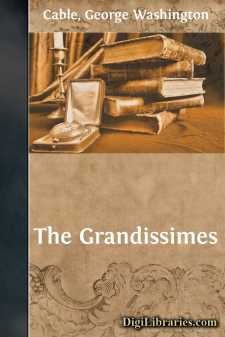Fiction
- Action & Adventure 180
- Biographical 15
- Christian 59
- Classics 6965
- Coming of Age 5
- Contemporary Women 3
- Erotica 8
- Espionage/Intrigue 12
- Fairy Tales, Folklore & Mythology 236
- Family Life 169
- Fantasy 117
- Gay 1
- General 596
- Ghost 32
- Historical 808
- Horror 43
- Humorous 160
- Jewish 25
- Legal 4
- Medical 22
- Mystery & Detective 315
- Political 49
- Psychological 41
- Religious 64
- Romance 159
- Sagas 11
- Science Fiction 730
- Sea Stories 113
- Short Stories (single author) 537
- Sports 10
- Suspense 1
- Technological 8
- Thrillers 2
- Urban Life 31
- Visionary & Metaphysical 1
- War & Military 173
- Westerns 199
Fiction Books
Sort by:
"Quite impossible, as you see, to start without an introduction," laughed Ivan. "Well, then, I mean to place the event described in the poem in the sixteenth century, an age—as you must have been told at school—when it was the great fashion among poets to make the denizens and powers of higher worlds descend on earth and mix freely with mortals... In France all the notaries'...
more...
CHAPTER I ANCESTRY AND BIRTH All history, says Emerson, "resolves itself into the biographies of a few stout and earnest persons." These remarks find exemplification in the life of William Ewart Gladstone, of whom they are pre-eminently true. His recorded life, from the early period of his graduation to his fourth premiership, would embrace in every important respect not only the history of the...
more...
INTRODUCTION According to the Spanish critics, the novel has flourished in Spain during only two epochs—the golden age of Cervantes and the period in which we are still living. That unbroken line of romance-writing which has existed for so long a time in France and in England, is not to be looked for in the Peninsula. The novel in Spain is a re-creation of our own days; but it has made, since the...
more...
CHAPTER I MASKED BATTERIES It was in the Théatre St. Philippe (they had laid a temporary floor over the parquette seats) in the city we now call New Orleans, in the month of September, and in the year 1803. Under the twinkle of numberless candles, and in a perfumed air thrilled with the wailing ecstasy of violins, the little Creole capital's proudest and best were offering up the first cool night...
more...
by:
Stephen Marlowe
He lit a cigarette, the last one they had, and asked his wife "Want to share it?" "No. That's all right." Diane sat at the viewport of the battered old Gormann '87, a small figure of a woman hunched over and watching the parade of asteroids like tiny slow-moving incandescent flashes. Ralph looked at her and said nothing. He remembered what it was like when she had worked by...
more...
On the veranda of the Bella Union Hotel, San Francisco, a man sat enjoying his morning pipe. The Bella Union overlooked the Plaza of that day, a dusty, unkempt, open space, later to be swept and graded and dignified into Portsmouth Square. The man was at the younger fringe of middle life. He was dressed neatly and carefully in the fashionable costume of the time, which was the year of grace 1852. As to...
more...
by:
Amy Prentice
TEDDY AND THE CALF. "Oh yes, I'll repeat it if you like; but I'd rather you didn't tell Teddy that you heard it, for he is already much too proud. This is the way it goes: Young Ted was a rider bold, Who never did things by half, And so he hitched to his cart one day A strong and frolicsome calf. Away he went, and on behind Came a troop of merry boys, Who...
more...
WAS it a specter? For days I could not answer this question. I am no believer in spiritual manifestations, yet—But let me tell my story. I was lodging with my wife on the first floor of a house in Twenty-seventh street. I had taken the apartments for three months, and we had already lived in them two and found them sufficiently comfortable. The back room we used as a bedroom, and while it...
more...
When I was a young man I once made a foreign journey, betaking myself to the royal court of X. on affairs of state. In those days politics would take strange turns, not of unmixed delight, and so it happened that my mission was prolonged well into the winter, and kept me at X. until the carnival season. But at this I did not repine, for to pass a winter in a beautiful climate and amid the fascinating...
more...
CHAPTER I THE GRAYMOUSE HOME Mother Graymouse, with her family lived in a cosy attic which was as snug and comfortable as any good mouse could wish. Her children were named Limpy-toes, Silver Ears, Buster, Teenty and Tiny, and Baby Squealer. Although they had many faults, upon the whole they were good children and made a happy family. On pleasant mornings, the sun shone in bright and warm through the...
more...











